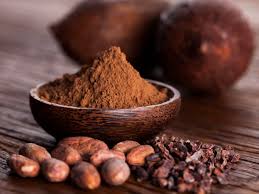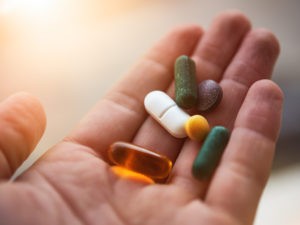
Diagnosed with Cancer? Your two greatest challenges are understanding cancer and understanding possible side effects from chemo and radiation. Knowledge is Power!
Learn about conventional, complementary, and integrative therapies.
Dealing with treatment side effects? Learn about evidence-based therapies to alleviate your symptoms.
Click the orange button to the right to learn more.
- You are here:
- Home »
- Blog »
- side effects ID and prevention »
- Cocoa Powder- Immune, Heart Health
Cocoa Powder- Immune, Heart Health

Cocoa powder is a super food. For me at least. Let me explain. I am a long-term cancer survivor. I live with a number of long-term side effects including chemotherapy-induced cardiomyopathy and atrial fibrillation.
As a long-term cancer survivor I am at risk for everything from the covid-19 virus to heart problems, etc. Because conventional medications caused so many health problems for me, I chose not to rely on conventional meds to manage my health as possible.
One of my evidence-based but non-conventional therapies is cocoa powder. I stir a tablespoon of it in my juice each morning along with a number of other powders. The health benefits of cocoa powder are many and listed below.
As you can read in the blog post linked to chemotherapy-induced cardiomyopathy (see above), I have improved or stabilized all of the heart health metrics that come with my annual echocardiogram.
For the record, I try not to take supplements when I can achieve the same goal with nutrition. I consider cocoa powder to be nutrition.
What are the health benefits of ingesting cocoa powder?
Cocoa powder, derived from cacao beans, is rich in various compounds that may offer several health benefits when consumed in moderation. Here are some potential health benefits associated with ingesting cocoa powder:
- Antioxidant Properties: Cocoa powder is a potent source of antioxidants, such as flavonoids and polyphenols. These compounds help neutralize free radicals in the body, reducing oxidative stress and the risk of chronic diseases.
- Heart Health: Studies suggest that the flavonoids in cocoa may have positive effects on heart health by improving blood flow, reducing blood pressure, and enhancing overall vascular function. Regular consumption of cocoa has been linked to a lower risk of cardiovascular diseases.
- Improved Mood: Cocoa contains substances like theobromine and phenylethylamine, which may have mood-enhancing effects. Additionally, cocoa stimulates the production of endorphins, contributing to an improved sense of well-being.
- Cognitive Function: Some research suggests that cocoa consumption may be associated with improved cognitive function. Flavanols in cocoa may have neuroprotective effects, promoting better blood flow to the brain and potentially reducing the risk of age-related cognitive decline.
- Blood Sugar Regulation: Cocoa has been studied for its potential to improve insulin sensitivity and regulate blood sugar levels. However, more research is needed to establish clear connections in this area.
- Anti-Inflammatory Effects: The antioxidants in cocoa may help reduce inflammation in the body. Chronic inflammation is linked to various health issues, including cardiovascular disease, diabetes, and certain cancers.
- Improved Skin Health: Some studies suggest that the consumption of cocoa may contribute to better skin health. The antioxidants may help protect the skin from oxidative damage and improve hydration.
- Mineral Content: Cocoa powder contains essential minerals such as magnesium, iron, and zinc, which play crucial roles in various bodily functions.
Have you been diagnosed with cancer? What type? What symptoms? Do you have chemotherapy-induced cardiomyopathy ? Let me know- David.PeopleBeatingCancer@gmail.com
Thank you,
David Emerson
- Cancer Survivor
- Cancer Coach
- Director PeopleBeatingCancer
Dark Chocolate Intake Acutely Enhances Neutrophil Count in Peripheral Venous Blood
“All participants provided an informed consent for participating in this study, which was carried out in accordance with the Declaration of Helsinki, and approved by the local ethics committee.
The study population consisted of 18 consecutive healthy male volunteers (37±10 years), recruited from the laboratory staff, in alphabetical order.
Exclusion criteria were history of hematological disorders, abnormalities of routine blood tests and signs or symptoms of disease, including weakness, cough, and fever. Each volunteer ingested 50 g of 90% cocoa chocolate (Noir Prodigieux, Lindt, Kilchberg, Switzerland) within 3 to 5 minutes.
The nutrition information of the 50 g chocolate was as follows:
- 1242 kJ (i.e., 296 kcal),
- 27.5 g of lipids (15 g of saturated fat acids),
- 7 g of carbohydrates (3.5 g of sugars),
- and 5 g of proteins.
Blood was drawn, immediately before chocolate intake and 4 hours after consumption, in K2EDTA evacuated blood tubes (Vacutest Kima, Padova, Italy). All subjects accomplished 8 hours of overnight fasting before chocolate ingestion, and were then refrained from eating, drinking, and smoking for the next 4 hours after chocolate intake.
White Blood Cell (WBC) count and differential count was performed using Siemens ADVIA 2120 (Siemens Healthcare Diagnostics, Tarrytown NY, USA). Differences of laboratory data before and after chocolate intake were evaluated with paired Wilcoxon’s signed-rank test and Bland-Altman plots (Analyze-it Software Ltd, Leeds, UK).
White Blood Cell Count and Differential Count Four Hours after Dark Chocolate Ingestion in Eighteen Ostensibly Healthy Subjects
| Parameter | Baseline
|
Four hours after dark chocolate ingestion
|
|
|---|---|---|---|
| Mean±SD | Mean±SD | p | |
| White blood cells (x109/L) | 5.9±0.9 | 7.0±0.9 | <0.001 |
| Neutrophils (x109/L) | 3.4±0.8 | 3.9±0.7 | 0.001 |
| Lymphocytes (x109/L) | 2.1±0.7 | 2.3±0.5 | 0.056 |
| Monocytes (x109/L) | 0.4±0.2 | 0.4±0.1 | 0.379 |
| Eosinophils (x109/L) | 0.2±0.2 | 0.2±0.2 | 0.146 |
| Basophils (x109/L) | 0.1±0.1 | 0.1±0.1 | 0.086 |
| LUC (x109/L) | 0.1±0.1 | 0.1±0.1 | 0.234 |
A significant increase of both WBC and neutrophils counts was observed 4 hours after dark chocolate intake, whereas the other parameters of WBC remained unmodified. The Bland-Altman plot analysis revealed a mean increase of 17% (95% CI, 12% to 23%) for WBC and 14% (95% CI, 6% to 22%) for neutrophils, respectively.
In conclusion, the acute effect of dark chocolate intake should be regarded as a potential source of biological (preanalytical) variability (5).
Furthermore, a recent study showed that acute cocoa consumption decreases the expression of adhesion molecules (6), thus leading to reduced migration of neutrophils in peripheral tissues (including atherosclerotic plaques), which would hence contribute to reduce local inflammation, whereas their increase in the circulation may promote more efficient response against pathogens…”
Cocoa and Cardiovascular Health
“Epidemiological data demonstrate that regular dietary intake of plant-derived foods and beverages reduces the risk of coronary heart disease and stroke. Among many ingredients, cocoa might be an important mediator.
Indeed, recent research demonstrates a beneficial effect of cocoa on
- blood pressure,
- insulin resistance,
- and vascular and platelet function.
Although still debated, a range of potential mechanisms through which cocoa might exert its benefits on cardiovascular health have been proposed, including activation of nitric oxide and antioxidant and antiinflammatory effects…
Conclusions
For many centuries, cocoa has been known for its good taste and its beneficial effects on health. Recent research revealed that cocoa does indeed exert beneficial cardiovascular effects, probably mediated mainly by its polyphenols, a heterogeneous group of molecules found primarily in fruits and vegetables. The beneficial effects of cacao are most likely due to an increased bioavailability of NO. This may explain the improvement in endothelial function, the reduction in platelet function, and the potentially beneficial effects on blood pressure, insulin resistance, and blood lipids.”


